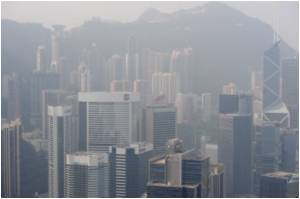Hong Kong will become hotter tomorrow, warn scientists, as an effect of the millions of air conditioners cooling the city today.

"I don't think I can function properly in Hong Kong's heat -- I need to be cool in order to think."
But that love affair with chilled air -- which is growing fast throughout Asia as living standards rise -- comes at a heavy environmental price.
Scientists predict that Hong Kong will have almost no winter by the end of the century as the electricity guzzlers help heat up the city.
"Local temperatures are rising at a speed of 0.6 degrees Celsius each decade, more than three times the global average," said Lee Boon-ying, director of the Hong Kong Observatory.
"The excessive use of any electricity-powered machines like air conditioners will accelerate global warming, raising temperatures."
Advertisement
Air conditioners account for up to 60 percent of Hong Kong's electricity usage in the hot, humid, sub-tropical summers, according to government figures.
Advertisement
Popular travel guide Lonely Planet warns travellers of the big chill, saying "temperatures are set so low you may find your extremities turning blue."
The government recommends buildings set all indoor temperatures at 25.5 degrees Celsius (77.9 Fahrenheit), but there is no legislation to force compliance.
Measurements taken by AFP inside some of Hong Kong's major shopping malls showed indoor temperatures around 21.5 degrees Celsius, far below the government's recommended figure.
The Environmental Protection Department (EPD) said it investigated any complaints and would press the venues to use air-conditioning efficiently.
Hong Kong is not alone in its growing dependence on cooler air, with the Asia-Pacific region representing the largest global air conditioning market.
The region accounted for about half of global demand in 2008, according to a report by US-based Global Industry Analysts, and is also the fastest growing market worldwide as income levels rise.
A large percentage of Hong Kong's air conditioners also use hydrochlorofluorocarbons (HCFCs), but less-harmful refrigerants are available, EPD spokeswoman Eva Wong said.
The environmental watchdog hopes to reduce consumption of HCFCs, which experts say deplete the ozone layer and contribute to climate change, by 90 percent over the next five years, she said.
Fighting climate change by putting cleaner vehicles on Hong Kong's jam-packed streets and cutting pollution from thousands of factories in nearby Guangdong province on China's mainland may be a Herculean challenge.
But the simple fan would go a long way in attacking the city's contribution to global warming, said Friends of the Earth Hong Kong environmental affairs manager Hahn Chu.
"No one wants to live in a sweatbox, and although replacing your air con with a greener version is one option, there are other ways to keep cool, like using fans," he said.
Source-AFP









